中考英语倒装句(最全面-最简洁)+动词和动词短语+动词的时态
英语语法 倒装句有哪些常见的类型
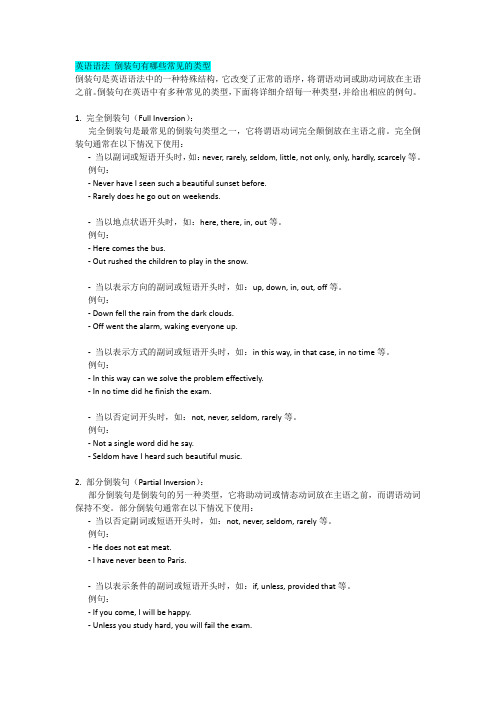
英语语法倒装句有哪些常见的类型倒装句是英语语法中的一种特殊结构,它改变了正常的语序,将谓语动词或助动词放在主语之前。
倒装句在英语中有多种常见的类型,下面将详细介绍每一种类型,并给出相应的例句。
1. 完全倒装句(Full Inversion):完全倒装句是最常见的倒装句类型之一,它将谓语动词完全颠倒放在主语之前。
完全倒装句通常在以下情况下使用:-当以副词或短语开头时,如:never, rarely, seldom, little, not only, only, hardly, scarcely等。
例句:- Never have I seen such a beautiful sunset before.- Rarely does he go out on weekends.-当以地点状语开头时,如:here, there, in, out等。
例句:- Here comes the bus.- Out rushed the children to play in the snow.-当以表示方向的副词或短语开头时,如:up, down, in, out, off等。
例句:- Down fell the rain from the dark clouds.- Off went the alarm, waking everyone up.-当以表示方式的副词或短语开头时,如:in this way, in that case, in no time等。
例句:- In this way can we solve the problem effectively.- In no time did he finish the exam.-当以否定词开头时,如:not, never, seldom, rarely等。
例句:- Not a single word did he say.- Seldom have I heard such beautiful music.2. 部分倒装句(Partial Inversion):部分倒装句是倒装句的另一种类型,它将助动词或情态动词放在主语之前,而谓语动词保持不变。
2023年中考英语强化训练---倒装句、动词的时态和语态

中考英语强化训练---倒装句、动词的时态和语态一、倒装句1. Tom and I belong to a team. If he doesn't agree on the plan, ________.A. neither do I.B. neither I will.C. nor do I.D. neither will I.2.—______—I'm looking forward to meeting him!A. Here comes him!B. Here him comes!C. Here comes he!D. Here he comes!3.—I ________ a good breakfast this morning.—Neither ________ I. Let's go and buy some snacks.A. hadn't; hadB. didn't have; hadC. didn't have; didD. hadn't; did4. There ________ little meat in the fridge. Let's go and buy some.A. hasB. isC. areD. isn't5. Nowadays, there ____ more heroes in China. We admire thema lot.A. isB. areC. wasD. were6.—Li Ping, I didn't go summer camping last year.—______.A. So did IB. Neither did IC. Neither I didD. So I did7. There ________ a teacher and many students in the classroom.A. haveB. hasC. areD. is8. There ________ two pet cats at Becky's home.A. haveB. isC. are9.—There _____ two basketball games on TV tomorrow night. —Really? That's wonderful.A. isB.wasC. areD.will be10.—Are there going to be any young trees?—Yes, _____.A. there beB.there isC. there areD. there are going to11.There ________ only one earth but billions of (数十亿) people in the world, so we should protect the earth.A. haveB. isC. are12. Once a term, there ________ a parents' meeting in our school.A. isB. areC. wasD. were13. There ______ some milk and several apples in the fridge.A. isB. areC. be14.—John had a good time yesterday.—_______A. So did Tom.B. So Tom was.C. So Tom did.D. So was Tom.15. Mr. Zhang gave a speech at the opening ceremony, and ______.A. so does Mr. LeeB. so Mr. Lee doesC. so did Mr. LeeD. neither did Mr. Lee16. Look, here ______ Mr. Wu. Let's go and tell him everything about it.A. is comeB. comesC. comingD. come17.—This book is very interesting. I have read it many times.—______.A. So I haveB. So have IC. So I didD. So did I18.—I'm very interested in listening to the folk music in western China.—______.A. So I amB. So am IC. So I doD. So do I19.—I could ride a bike when I was young.—______.A. So I couldB. So could IC. I can, tooD. I couldn't either20.—Jim is good at English.—______ He often speaks to foreigners.A. So is he.B. So he is.C. So was he.D. So he was.21.—I think the plan is just a waste of time. —Well, if you don't support it, ________.A. so will IB. so am IC. neither will ID. neither do I22. If you don't go hiking this Sunday, _______.A. so will IB. so do IC. neither will ID. neither do I23.—David has made great progress recently.—______ and ______.A. So he has; so you haveB. So he has; so have youC. So has he; so have you24.—It was the Dragon Boat Festival last Sunday. I drove to the Lianhua Lake to watch the boat races.—_____, but I didn't see you there.A. So I didB. So did IC. So do ID. Neither did I25. Only at that time _______ that he was wrong.A. he realizedB. did he realizeC. he did realize26.—I hear Lily made an English speech at the graduation ceremony yesterday.—_____ and _____.A. So did she; so I didB. So she did; so did IC. So she did; so I wasD. So did she; so I was27.一Peter has made great program in English recently. —_____________. He has been studying so hard these days.A. So have heB. So he hasC. So he haveD. So has he28.—Will you go to the park tomorrow?—If you don't, _____.A. so do IB. so will IC. neither do ID. neither shall I29.—I never go to bed late and get up late.—________.A. So does JillB. So is JillC. Neither does JillD. Neither is Jill30. There ________ some milk and some fruit on the table.A. isB. areC. beD. aren't二、动词的时态和语态1.—I wonder if Mike ______ swimming this afternoon. —If he ______ his homework, he will go with us.A. goes; finishesB. will go; finishesC. goes; will finishD.will go; will finish2.Chinese ________ widely all over the world because ofChina's rapid development.A. speaksB. was spokenC. is spoken3.—Mike, you _______ the magazine since last week. Can you return it now?—Sure.A.borrowedB.have borrowedC.have kept4.The film ______ for fifteen minutes.A.beganB.has begunC.has been on5.—Is Lucy at home ?—No. She ______ the cinema. She ______ there twenty minutes ago.A.has gone to; wentB.has gone to; has beenC.has been to; went6.Tomorrow is Saturday, we ________ my grandparents.A. visitB. are going to visitC. will visitsD.are visiting7.—What did you do last weekend, Judy?—I ________ the science museum with my father.A. visitB. visitedC. have visitedD. will visit8.The National Day of the People's Republic of China ________ on October 1st every year.A. was celebratedB. is celebratedC. has been celebratedD. will be celebrated9.—I wonder if Miss Lin ________ back in a week.—I think she will call us if she ________ back.A. will come; will comeB. comes; will comeC. will come; comes10.—Who's the old woman in the photo?—This is my grandma. She ________ for 5 years. I miss her very much.A. has been deadB. has diedC. died11.Gina went to the doctor's yesterday and she ______ about the importance of good living habits once more.A.toldB.is toldC.was toldD.has told12.—Celia, join us in the Super Summer Camp if it _______ this weekend.—I'd love to. But nobody knows if it ______.A.is fine; rainsB.is fine; will rainC.will be fine; will rainD.will be fine; rains13.—Perfect photos! Good skills!—Thank you. They________ by my Huawei mobile phone. A.took B.were takenC.will be takenD.are taking14.—Excuse me, could you please tell me if the sportsmeeting _____ on time?—It depends. If it _____ tomorrow, we'll have to put it off.A. will start; rainsB. starts; rainsC. will start; will rainD. starts; will rain15.—The film Nezha is so wonderful. You shouldn't miss it. —If I have time, I _________ it.A.will watchB.watchC.watchedD.washes16.—Have you seen our English teacher?—Yes, I ______ her in the library just now.A.have metB.metC.meet17.—What are you going to do this weekend?—I will go to Hefei __________ it doesn't rain this weekend.A. whenB. untilC. ifD. and18.—Would you like something to eat, Mary?—Of course. Although I __________ lunch, I am feeling a little hungry now.A. will haveB. haveC. am havingD. had19.—Hi, Jane, tell you a piece of good news. I _____ America tomorrow.—Wow, enjoy yourself!A.left forB.leaves forC. am leaving for20.—Water pollution is still a serious problem around the world.—I think so. If more clean water ________, it will help to solve the problem of water shortage.A. protectsB. is protectedC. has been protectedD. has protected21.—Do you know where Claudia is?—Yes, she's in Room 303. When I saw her, she ______ a drum.A.beatB.was beatingC.will beat22.There _______ an English party in our class next week.A. is going to haveB. is going to beC. will have23.Our neighbors welcomed us warmly as soon as we ________.A.arrivedB.arriveC.will arrive24.Many topics ________ in the course, ________ food and drinks, travel and hotels.A. cover; includeB. are covered; includingC. covers; includingD. are covered; include25.Could you tell me if Li Lei ________ to my party?A. will comeB. comesC. comingD. came26.—You look unhappy, what happened?—Bad luck. I planned to go to Shenzhen, but the plane________ when I ________ at the airport.A. has left; arrivedB. had left; arrivedC. left; arrives27.Steve ______ English every morning.A. readsB. readC. is reading28.These flowers ________ three times a week in such hot weather, or they may die.A. should waterB. shouldn't waterC. should be wateredD. shouldn't be watered29.A lot of trees ________ on the hill yesterday.A. are plantedB. will be plantedC. have been plantedD. were planted30.I'm sorry the coats in this color ________ yesterday. Would you like to try another one?A.was sold outB.are sold outC.has been sold outD.were sold out。
2023年中考英语冲刺复习知识点倒装句
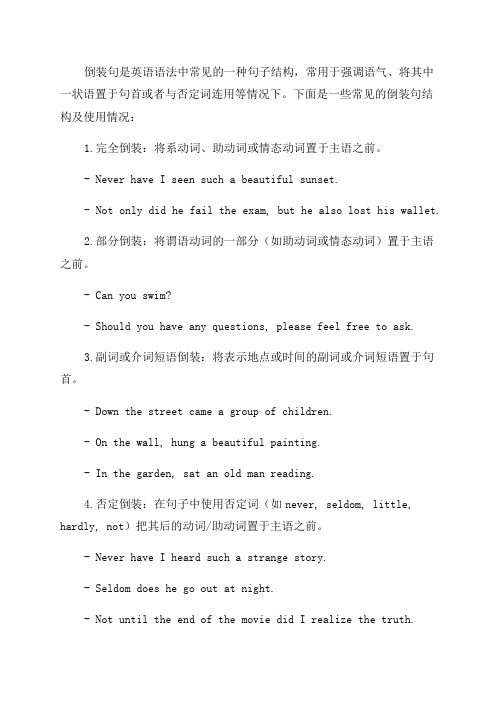
倒装句是英语语法中常见的一种句子结构,常用于强调语气、将其中一状语置于句首或者与否定词连用等情况下。
下面是一些常见的倒装句结构及使用情况:1.完全倒装:将系动词、助动词或情态动词置于主语之前。
- Never have I seen such a beautiful sunset.- Not only did he fail the exam, but he also lost his wallet.2.部分倒装:将谓语动词的一部分(如助动词或情态动词)置于主语之前。
- Can you swim?- Should you have any questions, please feel free to ask.3.副词或介词短语倒装:将表示地点或时间的副词或介词短语置于句首。
- Down the street came a group of children.- On the wall, hung a beautiful painting.- In the garden, sat an old man reading.4.否定倒装:在句子中使用否定词(如never, seldom, little, hardly, not)把其后的动词/助动词置于主语之前。
- Never have I heard such a strange story.- Seldom does he go out at night.- Not until the end of the movie did I realize the truth.请注意,倒装句的用法是多种多样的,具体要根据句子的语境和语法规则来确定是否使用倒装结构。
在复习中,可以通过阅读和分析倒装句的例子,了解不同情况下倒装句的用法,同时也要多做习题来加深理解和熟练掌握。
初高中简明英语语法—倒装句
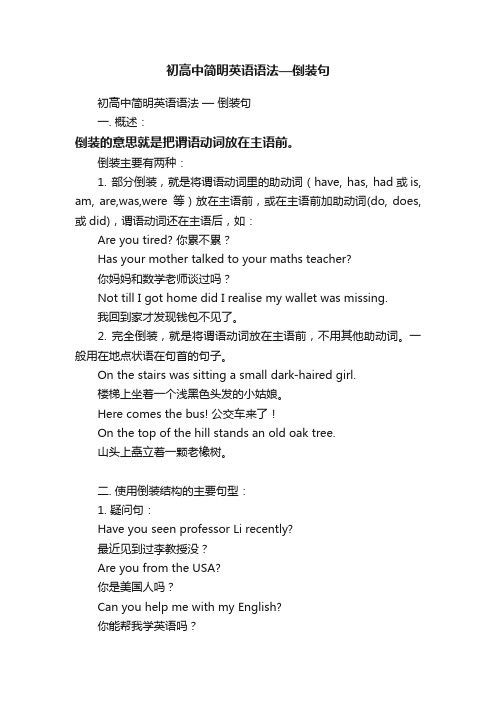
初高中简明英语语法—倒装句初高中简明英语语法—倒装句一. 概述:倒装的意思就是把谓语动词放在主语前。
倒装主要有两种:1. 部分倒装,就是将谓语动词里的助动词(have, has, had或is, am, are,was,were等)放在主语前,或在主语前加助动词(do, does,或did),谓语动词还在主语后,如:Are you tired? 你累不累?Has your mother talked to your maths teacher?你妈妈和数学老师谈过吗?Not till I got home did I realise my wallet was missing.我回到家才发现钱包不见了。
2. 完全倒装,就是将谓语动词放在主语前,不用其他助动词。
一般用在地点状语在句首的句子。
On the stairs was sitting a small dark-haired girl.楼梯上坐着一个浅黑色头发的小姑娘。
Here comes the bus! 公交车来了!On the top of the hill stands an old oak tree.山头上矗立着一颗老橡树。
二. 使用倒装结构的主要句型:1. 疑问句:Have you seen professor Li recently?最近见到过李教授没?Are you from the USA?你是美国人吗?Can you help me with my English?你能帮我学英语吗?2.否定意思的状语在句首:Seldom do we see such an amazing display of dance.我们很少能欣赏到如此美妙的舞蹈表演。
Little did he know!他知道的很少!Rarely will you hear such beautiful music.你难得听到如此美妙的音乐。
Hardly had I got into bed when the telephone rang.我刚上床电话响了。
初中英语倒装句归纳为7种类型

初中英语倒装句归纳为7种类型倒装句是英语中的一种特殊句型,它与正常语序的句子相反,通常用于强调、疑问、感叹等语境。
在初中英语学习中,掌握倒装句的基本类型和用法是非常重要的。
以下是初中英语倒装句的七种类型:1.完全倒装:这种倒装句中,主语和谓语完全颠倒位置,通常用于强调或描述性语句。
例如:“In the room sat an old man.”(房间里坐着一个老人。
)2.部分倒装:只有助动词、情态动词或be动词与主语交换位置,其他部分保持正常语序。
例如:“Never have I seen such a beautiful sunset.”(我从未见过如此美丽的日落。
)3.疑问倒装:在一般疑问句中,助动词或be动词提前,形成疑问倒装。
例如:“Do you likeapples?”(你喜欢苹果吗?)4.强调倒装:通过使用“only + 状语”或“not only ... but also”等结构,可以形成强调倒装。
例如:“Only in this way can we solve the problem.”(只有这样我们才能解决问题。
)5.so/neither/nor倒装:当表示“也”或“也不”时,so、neither或nor引导的句子会采用部分倒装。
例如:“He studies hard, and so do I.”(他学习努力,我也一样。
)6.as/though引导的倒装:在as或though引导的让步状语从句中,通常会将表语或状语提前,形成倒装。
例如:“Child as he is, he knows a lot.”(尽管他还是个孩子,但他知道很多。
)7.虚拟条件句中的倒装:在虚拟条件句中,如果省略了if,且条件句使用了were、had或should,那么条件句需要采用部分倒装。
例如:“Had I known earlier, I would have helped.”(如果我早知道,我就会帮忙。
(完整版)初中英语倒装句简单版
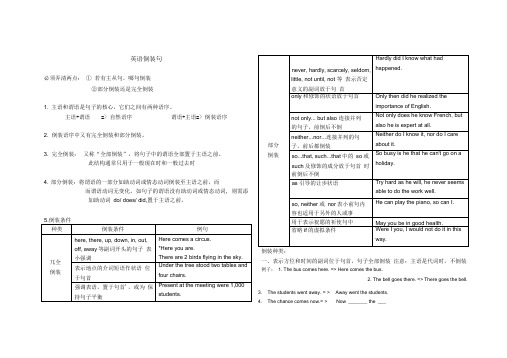
英语倒装句必须弄清两点:① 若有主从句,哪句倒装②部分倒装还是完全倒装1. 主语和谓语是句子的核心,它们之间有两种语序。
主语+谓语=> 自然语序谓语+主语=> 倒装语序2. 倒装语序中又有完全倒装和部分倒装。
3. 完全倒装:又称“全部倒装”,将句子中的谓语全部置于主语之前。
此结构通常只用于一般现在时和一般过去时4. 部分倒装:将谓语的一部分如助动词或情态动词倒装至主语之前,而而谓语动词无变化。
如句子的谓语没有助动词或情态动词, 则需添加助动词do/ does/ did,置于主语之前。
倒装种类:一、表示方位和时间的副词位于句首,句子全部倒装注意:主语是代词时,不倒装例子:1. The bus comes here. => Here comes the bus.2. The bell goes there. => There goes the bell.3. The students went away. = > Away went the students.4. The chance comes now.= > Now _______ the ___5. He rushed out. => Out __ .6. He comes here. => There二、以介词短语表示的状语,提前位于句首,全部倒装。
例子1. A tower stands in front of our school.=> In front of our school stands a tower.2. A temple stands at the top of the mountain.=> the top of mountain stands .3. Christmas trees, flowers and toys are among the goods.=> the goods Christmas trees, flowers and toys.三、表语位于句首,倒装结构表语+系动词+主语A. 形容词+系动词+主语Professor White and many other guests were present at the meeting.=> Present at the meeting were Professor White and many other guests.B. 过去分词+系动词+主语The days when they could do are gone.=> Gone are the days when they could do.四、将so/ neither/ nor放在开头,表示"••也(不)…",部分倒装注意:表示确实是这样”不倒装1. He went to the film last night. So did I.2. You must finish your work, so I.3. She is interested in the story, so I.4. He didn ' turn up. Neither his brother.*5. His mother told him not to go to the film. So he did.五、在if条件句,通常可以省略if,而将从句倒装条件:在if条件句,必须含有系动词were,助动词had情态动词should1. If he were younger, he would learn skating.Were he younger, he would learn skating.2. If they should forget to bring a map with them, they would get lost in the woods. they forgetto bring a map with them, they would get lost in woods.3. If they had realize how important the task was, they wouldn ' have refused to accept.=> they how important the task was, they wouldn ' have refused to accept.4. If I were you, I would help her.=> I you, I would help her.六、否定词或半否定词位于句首,部分倒装never/ little/ seldom/ not/ nowhere/ scarcely/ few/by no means(决不)/ at no time(从不)1. I have never been there. => Never have I been there.2. I knew little about it. => Little did I know about it.3. She seldom came late to school =>did she late to school.4. You should buy that kind of car by no means.should you that kind of car.七、以not until/ no sooner ••- than(一••就)/hardly ••- when(刚…就)/所引导的状语放在句首,部分倒装1. She didn't realize that she had lost her necklace until she got home.She realized that she had lost her necklace when she got home.=> Not until she got home did she realize that she had lost her necklace.直到她到了家才发现她丢了项链。
2023年中考英语冲刺复习知识点倒装句
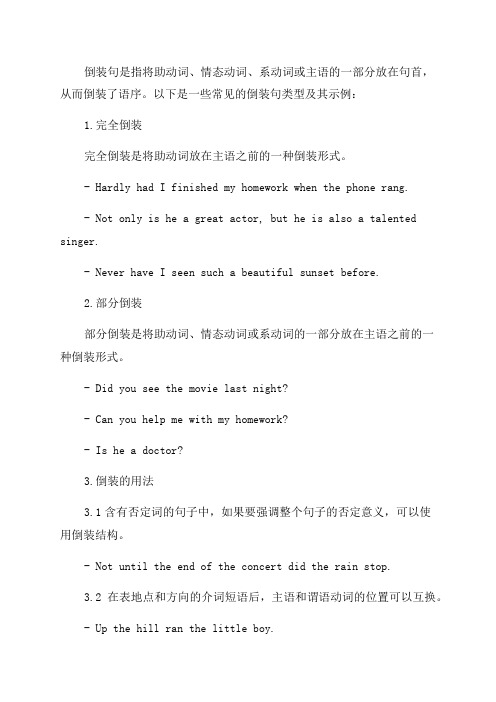
倒装句是指将助动词、情态动词、系动词或主语的一部分放在句首,从而倒装了语序。
以下是一些常见的倒装句类型及其示例:1.完全倒装完全倒装是将助动词放在主语之前的一种倒装形式。
- Hardly had I finished my homework when the phone rang.- Not only is he a great actor, but he is also a talented singer.- Never have I seen such a beautiful sunset before.2.部分倒装部分倒装是将助动词、情态动词或系动词的一部分放在主语之前的一种倒装形式。
- Did you see the movie last night?- Can you help me with my homework?- Is he a doctor?3.倒装的用法3.1含有否定词的句子中,如果要强调整个句子的否定意义,可以使用倒装结构。
- Not until the end of the concert did the rain stop.3.2在表地点和方向的介词短语后,主语和谓语动词的位置可以互换。
- Up the hill ran the little boy.- On the table lay a book.3.3在含有条件状语从句的句子中,将主句的主语和谓语动词的位置互换。
- Should you need any help, feel free to contact me.3.4在一些表示祝愿、要求、建议的句子中,谓语动词和主语的位置可以互换。
- Long live the Queen!- May I use your phone?以上是一些常见的倒装句类型及其示例。
希望对你的2023年中考英语复习有所帮助!。
初中英语倒装句总结
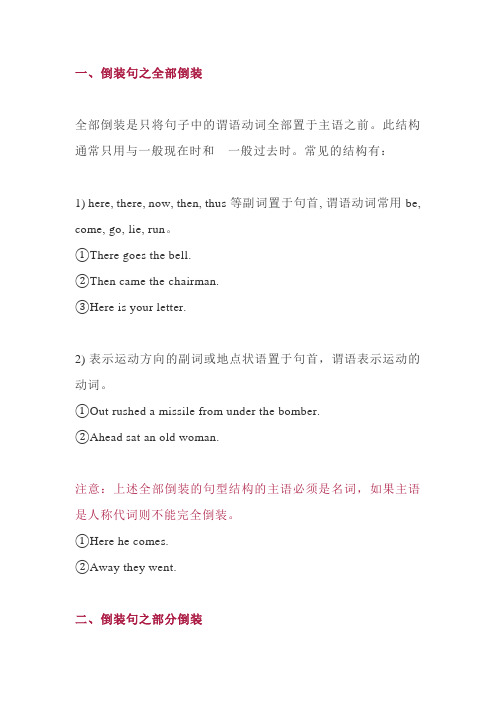
一、倒装句之全部倒装全部倒装是只将句子中的谓语动词全部置于主语之前。
此结构通常只用与一般现在时和一般过去时。
常见的结构有:1) here, there, now, then, thus等副词置于句首, 谓语动词常用be, come, go, lie, run。
①There goes the bell.②Then came the chairman.③Here is your letter.2) 表示运动方向的副词或地点状语置于句首,谓语表示运动的动词。
①Out rushed a missile from under the bomber.②Ahead sat an old woman.注意:上述全部倒装的句型结构的主语必须是名词,如果主语是人称代词则不能完全倒装。
①Here he comes.②Away they went.二、倒装句之部分倒装部分倒装是指将谓语的一部分如助动词或情态倒装至主语之前。
如果句中的谓语没有助动词或情态动词,则需添加助动词do, does或did,并将其置于主语之前。
1)句首为否定或半否定的词语,如no, not, never, seldom, little, hardly, at no time, in no way, not until…等。
①Never have I seen such a performance.②Nowhere will you find the answer to this question.③Not until the child fell asleep did the mother leave the room.当Not until引出主从复合句,主句倒装,从句不倒装。
注意:如否定词不在句首不倒装。
①I have never seen such a performance.②The mother didn't leave the room until the child fell asleep.典型例题1)Why can't I smoke here?At no time___ in the meeting-roomA. is smoking permittedB.smoking is permittedC. smoking is it permittedD.does smoking permit答案A. 这是一个倒装问题。
中考英语倒装句讲解
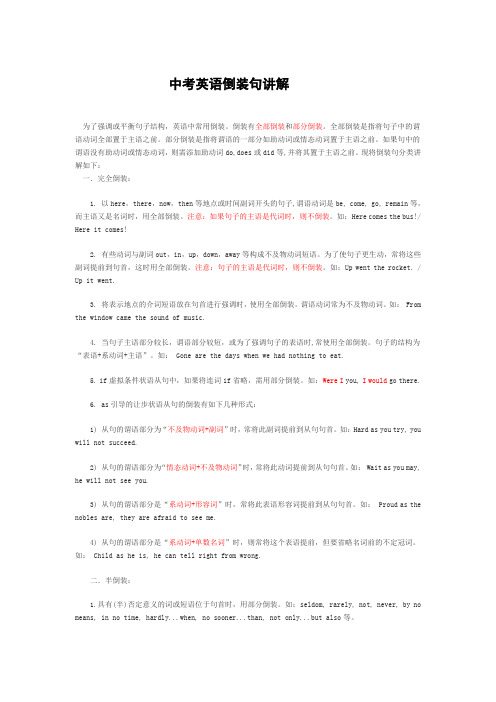
中考英语倒装句讲解为了强调或平衡句子结构,英语中常用倒装。
倒装有全部倒装和部分倒装。
全部倒装是指将句子中的谓语动词全部置于主语之前。
部分倒装是指将谓语的一部分如助动词或情态动词置于主语之前。
如果句中的谓语没有助动词或情态动词,则需添加助动词do,does或did等,并将其置于主语之前。
现将倒装句分类讲解如下:一.完全倒装:1. 以here,there,now,then等地点或时间副词开头的句子,谓语动词是be, come, go, remain等,而主语又是名词时,用全部倒装。
注意:如果句子的主语是代词时,则不倒装。
如:Here comes the bus!/ Here it comes!2. 有些动词与副词out,in,up,down,away等构成不及物动词短语。
为了使句子更生动,常将这些副词提前到句首,这时用全部倒装。
注意:句子的主语是代词时,则不倒装。
如:Up went the rocket. / Up it went.3. 将表示地点的介词短语放在句首进行强调时,使用全部倒装。
谓语动词常为不及物动词。
如: From the window came the sound of music.4. 当句子主语部分较长,谓语部分较短,或为了强调句子的表语时,常使用全部倒装。
句子的结构为“表语+系动词+主语”。
如: Gone are the days when we had nothing to eat.5. if虚拟条件状语从句中,如果将连词if省略,需用部分倒装。
如:Were I you, I would go there.6. as引导的让步状语从句的倒装有如下几种形式:1) 从句的谓语部分为“不及物动词+副词”时,常将此副词提前到从句句首。
如:Hard as you try, you will not succeed.2) 从句的谓语部分为“情态动词+不及物动词”时,常将此动词提前到从句句首。
2024年中考英语冲刺复习知识点倒装句
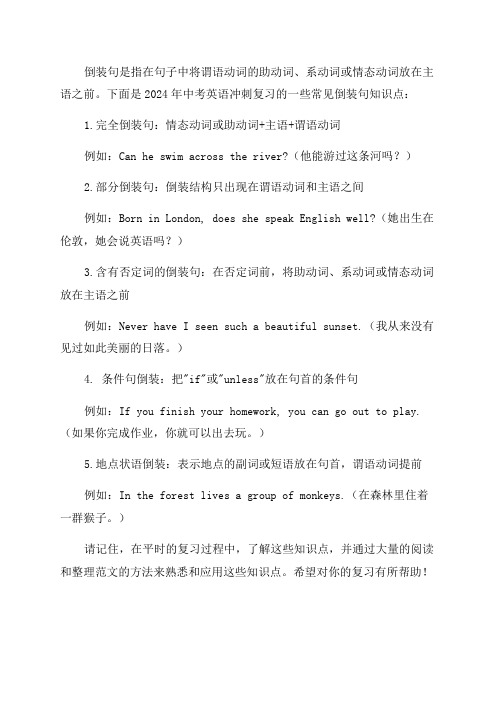
倒装句是指在句子中将谓语动词的助动词、系动词或情态动词放在主语之前。
下面是2024年中考英语冲刺复习的一些常见倒装句知识点:
1.完全倒装句:情态动词或助动词+主语+谓语动词
例如:Can he swim across the river?(他能游过这条河吗?)
2.部分倒装句:倒装结构只出现在谓语动词和主语之间
例如:Born in London, does she speak English well?(她出生在伦敦,她会说英语吗?)
3.含有否定词的倒装句:在否定词前,将助动词、系动词或情态动词放在主语之前
例如:Never have I seen such a beautiful sunset.(我从来没有见过如此美丽的日落。
)
4. 条件句倒装:把"if"或"unless"放在句首的条件句
例如:If you finish your homework, you can go out to play.(如果你完成作业,你就可以出去玩。
)
5.地点状语倒装:表示地点的副词或短语放在句首,谓语动词提前
例如:In the forest lives a group of monkeys.(在森林里住着一群猴子。
)
请记住,在平时的复习过程中,了解这些知识点,并通过大量的阅读和整理范文的方法来熟悉和应用这些知识点。
希望对你的复习有所帮助!。
中考英语语倒装句

Tom can speak French. So can Jack.
典型例题
---Do you know Jim quarrelled with his brother?
41. ( 2018 兰 州 35 题 ) Only yesCterd ay A find out that his purse wa s lost.
A. he was B. was he C. did he D. he did
42. ( 2017 天 水 47 题 ) — It's very co
ld in Shenyang in winter.
— A here.
A. So it is
B. So was it
C. So it does D. So does it
Only after being asked three times did he come to the meeting.
Only when he is seriously ill, does he ever stay in bed. 只有病得很重时,他才卧床休息
五、so, neither, nor倒装
---I don't know, _____.
A. nor don't I care B. nor do I care C. I don't care neither D. I don't care
also
答案:B. nor为增补意思"也不关心",因此句子应倒装。A错在用 don't 再次否定,
关于中考中的倒装句知识点归纳与总结

关于中考中的倒装句知识点归纳与总结在中考英语考试中,倒装句是一个重要的语法知识点。
掌握倒装句的用法对于学生来说是非常关键的,因为它经常在选择题和填空题中出现。
本文将对中考中的倒装句做一个归纳与总结,帮助学生更好地掌握其用法。
一、倒装句的定义倒装句是指将句子中的主语和谓语动词的语序颠倒过来。
一般而言,在肯定句中,只有在特定情况下才会使用倒装句。
二、完全倒装句1. 在以副词here, there或者表示地点的介词短语开头的句子中,主语和谓语动词需要完全倒装。
例子:There is a book on the table.(书在桌子上)On the table is a book.(桌子上有一本书)2. 在以表示方向的副词开头的句子中,主语和谓语动词需要完全倒装。
例子:Down the street ran the little boy.(小男孩沿着街道跑去了)Up the hill walked the old man.(老人走上了山坡)3. 在以表示否定意义的副词或短语开头的句子中,主语和谓语动词需要完全倒装。
例子:Never have I been to Paris.(我从未去过巴黎)Not only does he play basketball, but he also swims.(他不仅打篮球,而且游泳)三、部分倒装句在特定情况下,也可以使用部分倒装句。
部分倒装句是指将助动词或情态动词与主语调换位置,而谓语动词保持不变。
1. 在以表示否定意义的副词或短语放在句首时,用部分倒装。
例子:Never have I seen such a beautiful sunset.(我从未见过如此美丽的日落)Not until today did I realize the importance of hard work.(直到今天我才意识到努力的重要性)2. 在以so或neither开头的句子中,也需要使用部分倒装。
中考语法(倒装句)精选
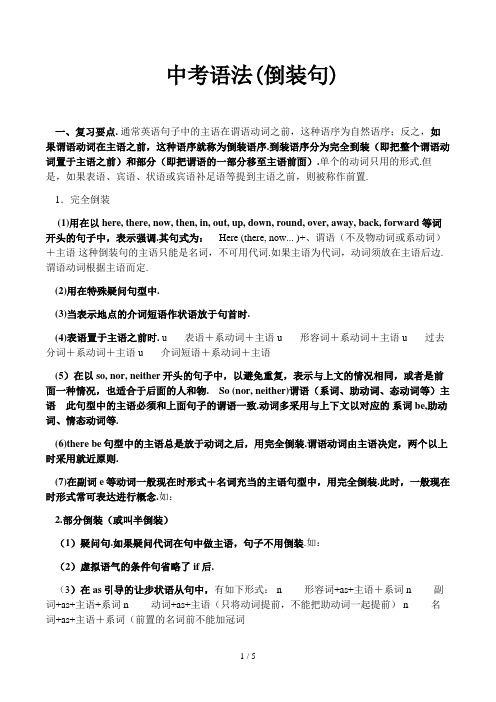
中考语法(倒装句)一、复习要点.通常英语句子中的主语在谓语动词之前,这种语序为自然语序;反之,如果谓语动词在主语之前,这种语序就称为倒装语序.到装语序分为完全到装(即把整个谓语动词置于主语之前)和部分(即把谓语的一部分移至主语前面).单个的动词只用的形式.但是,如果表语、宾语、状语或宾语补足语等提到主语之前,则被称作前置.1.完全倒装(1)用在以here, there, now, then, in, out, up, down, round, over, away, back, forward 等词开头的句子中,表示强调.其句式为: Here (there, now... )+、谓语(不及物动词或系动词)+主语这种倒装句的主语只能是名词,不可用代词.如果主语为代词,动词须放在主语后边.谓语动词根据主语而定.(2)用在特殊疑问句型中.(3)当表示地点的介词短语作状语放于句首时.(4)表语置于主语之前时. u 表语+系动词+主语 u 形容词+系动词+主语 u 过去分词+系动词+主语 u 介词短语+系动词+主语(5)在以so, nor, neither开头的句子中,以避免重复,表示与上文的情况相同,或者是前面一种情况,也适合于后面的人和物. So (nor, neither)谓语(系词、助动词、态动词等)主语此句型中的主语必须和上面句子的谓语一致.动词多采用与上下文以对应的系词be,助动词、情态动词等.(6)there be句型中的主语总是放于动词之后,用完全倒装.谓语动词由主语决定,两个以上时采用就近原则.(7)在副词e等动词一般现在时形式+名词充当的主语句型中,用完全倒装.此时,一般现在时形式常可表达进行概念.如:2.部分倒装(或叫半倒装)(1)疑问句.如果疑问代词在句中做主语,句子不用倒装.如:(2)虚拟语气的条件句省略了if后.(3)在as引导的让步状语从句中,有如下形式: n 形容词+as+主语+系词 n 副词+as+主语+系词 n 动词+as+主语(只将动词提前,不能把助动词一起提前) n 名词+as+主语+系词(前置的名词前不能加冠词(4)在以否定或半否定的副词开头的句子中用部分倒装,这类词常见的有:hardly, little, seldom,rarely, scarcely, never, not only, not till. 当little, not only --- but also放在句首修饰或连接两个主语时,句子倒装. not移至句首引起倒装时,不能把not单独提前,要和有关系的短语一同前置.(5)用于hardly --- when ---,scarcely --- when---,和no sooner---than---句型中.(6)用在以only开头的句子中.副词助动词 only + 介词短语 + be动词 +主语状语从句情态动词(7)直接引语的部分或全部放在句首,句子要到装.此时主语必须是名词,如果主语为代词,句子可不到装.(8)Neither(nor/so) +主语+谓语,重复前面的话,或对前面的内容表示肯定,表示对上文的赞许、肯定、确定等含义.二、理解性训练.1.Not only___ difficult to understand, but it was too long.A. was itB. it wasC. it isD. is it2._______, she was very brave.A.As she was a girl B A girl as she was. C.Girl as she was D. Girl as she wasA. does he begin toB. began he toC.had he began toD. did he begin to4. Only when thousands of flowers bloom together______.A. spring will be considered hereB. could spring be considering hereC. can spring be considered hereD. spring can be considered here5. --Where is my dictionary?A. There it isB. There is itC. There isD. Here it.6. Often________ these Young Pioneers _____good deeds.A. have I seen; doingB.have I seen; to doC. have seen I; doD.have I seen; do7. Not once ______him to.A. he has done as I askedB. he has done like I askC. has he done as I askedD. has he done like I've asked8. Such a noise _____that I couldn't go on with my reading.A. in the room there wasB.was there in the roomC.there is in the room my dictionary?D. is there in the room9. ____of it ,for it happened long time ago.A. Little thought IB.I little have thoughtC. Little have I thoughtD. Did little I think10. Be ,please. Hardly hear the speaker.A. quite; can IB. quiet; I can andC. quiet; canD. quiet; can't11. _____and the lesson began.A. In came Mr BrownB. Mr Brown in cameC. In came he began.D.Came in Mr Brown12. Little ____that results of the experiments.A. Susan knewB. did Susan knowC. knew SusanD. was Susan known13. Such_____ the results of the experiments.A. isB. wasC. areD. as be14. I like to watch TV plays, but I don't watch TV every evening. --_______.A. So do IB. Neither do IC. I do soD.So it is with me15._____the rain stop, the crops would be saved.A. DidB. ShouldC. WouldD. Will16.--Where is your father?---Oh_____.17. Only after his death______ considered correct.A. was his theoryB. his theory wasC. did his theoryD. had his theory18._________his appearance that no one could recognize him.A. So it was strangeB. Was so strangeC. So strange it, wasD. Strange so it was19.I finally got the job I dreamed about. Never in all my life _____so happy.A. did I feelB.I feltC.I had leftD. had I felt20. It's very cold here outside the room. _______.A.So it isB. So it doesC. So does itD. So it isn'tI.单项填空.1.Mr Huang can speak a little German, and_____.A. I can soB. so I canC. can I soD. so can I2.Father read the newspaper, and_________ .A. so do. IB. so I doC. so I didD. so did I.3. The cat is in the tree. --______.A. So it isB. So is itC. It's soD. So it does4.My good friend Jim wants to be a soldier when he grows up._________. A. So am I B. Neither will I C.So do I D.Nor do I5.n’t speak French well.---_______.A. Neither can my sisterB. It's a pleasureC.Nor can't my sisterD.So can't my sister II.翻译句子.1.他不会游泳.我也不会.2.它可能在那个口袋里.啊,真的.3.他们要去参观那家工厂,你们也去..他会骑自行车.他确实会.5.铃响了.6.我兄弟没去过大连.他确实没去过那儿.7.这是为你买的一双新鞋.初中英语语法总复习专题 20 (倒装句)答案二、理解性训练.1-5 ADCAD 6-10 DCDBB 11-15 AACAA 16-20 DACDA I.单项填空.1-5 DDACAII. 1.He can’t swim. Neither can I.2.It may be in that pocket. Oh, so it is.3.They will visit that factory. So will you.4.He can ride a bike. So he can .5.There goes the bell.6.My brother hasn’t been to Dalian. Neither he has.7. Here is a pair of new shoes for you.。
2024年中考英语倒装句详细讲解和讲义

2024英语中考倒装句详细讲解和讲义一、倒装句定义:英语中的倒装语序是一种语法结构,用于强调某些信息、改变语气或满足特定的语言要求。
在英语中,倒装语序有以下几种形式:二、倒装句种类:1.完全倒装:将助动词或情态动词放在主语之前,形成完全倒装。
例如:He is going to the party. →Is he going to the party?They have finished their work. →Have they finished their work?2.部分倒装:将助动词或情态动词与主语之间颠倒顺序,形成部分倒装。
常见的情况包括:否定词位于句首时:Never have I seen such a beautiful sunset.表示地点或方向的介词短语置于句首时:Up the hill ran the children.only 和so 位于句首时:Only when the rain stops will we go for a walk. So beautiful was the sunset that it took my breath away.3.倒装问句:将助动词或情态动词放在句首,形成倒装问句。
例如:Are you going to the party?Can she swim?三、中考常见的倒装句型:1.There be句型的倒装句的具体讲解:定义:"There be" 句型是用来表达存在或出现某人或某物的句子结构。
在倒装语序中,当使用"there be" 句型时,主语"there" 和动词"be" 的顺序被颠倒,即形成了倒装句。
具体讲解如下:(1)肯定句的倒装:在肯定句中,当使用"there be" 句型时,主语"there" 和动词"be" 需要颠倒位置。
中考英语--倒装句

中考英语--倒装句英语语法中的倒装分为全部倒装和部分倒装两类。
全部倒装包括:1. There be句型2. 方位词位于句首的倒装3. be动词后表语提前的倒装部分倒装包括:1. “Only加状语”位于句首的倒装2. 否定词或短语位于句首的倒装3. As/So/Neither/Nor位于句首的结构4. as表“尽管”引起的倒装5. so/such位于句首的倒装6. 虚拟条件句省略if的倒装方位词位于句首的倒装表示方位的副词或介词短语,如here,there,now,then,up,down,away,out等置于句首,可引起句子的完全倒装。
如:1. There stands a tall man at the gate.门口那儿站着一个高个男人。
2. A beggar came in.→ In came a beggar.一个乞丐进来了。
3. Off went the gun and out rushed our team, confident andcourageous.枪声一响,我们小组就冲出去了,组员们自信又勇敢。
4. ________________, with an umbrella in her hand.那个女孩跑开了,手里拿着把伞。
5. ________________ all of a sudden, scaring the couple to death. 突然跑出一只北极熊,把这对夫妇吓得半死。
be动词后表语提前的全部倒装be动词后的表语部分全部提前,引起完全倒装,包括进行时和被动语态的倒装。
如:6.That kindness and honesty make a decent man isworth-mentioning.→ Worth-mentioning is that kindness and honesty make a decent man.值得一提的是,善良和诚实塑造了一个正直的人。
九年级倒装句知识点汇总
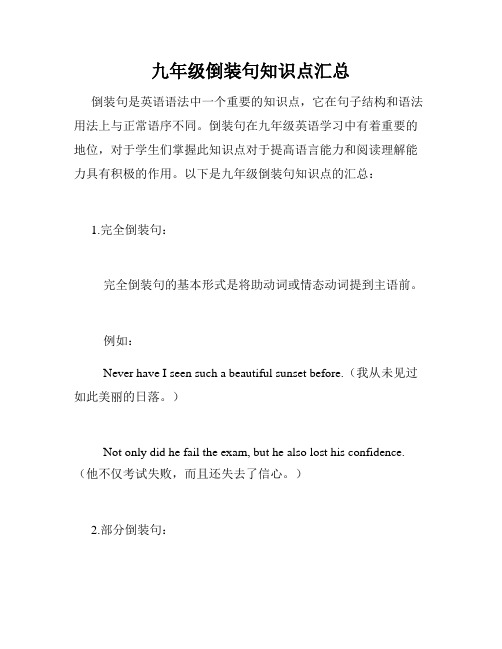
九年级倒装句知识点汇总倒装句是英语语法中一个重要的知识点,它在句子结构和语法用法上与正常语序不同。
倒装句在九年级英语学习中有着重要的地位,对于学生们掌握此知识点对于提高语言能力和阅读理解能力具有积极的作用。
以下是九年级倒装句知识点的汇总:1.完全倒装句:完全倒装句的基本形式是将助动词或情态动词提到主语前。
例如:Never have I seen such a beautiful sunset before.(我从未见过如此美丽的日落。
)Not only did he fail the exam, but he also lost his confidence.(他不仅考试失败,而且还失去了信心。
)2.部分倒装句:部分倒装句是将助动词或情态动词提到了句首,但主语并没有完全颠倒。
例如:Rarely does he go to bed before midnight.(他很少在午夜前上床睡觉。
)Seldom have I seen such a talented young musician.(我很少见过如此有才华的年轻音乐家。
)3.条件状语从句中的倒装句:在条件状语从句中,如果从句位于句首,通常需要进行倒装。
例如:Should you need any further assistance, please feel free to contact us.(如果你需要进一步的帮助,请随时与我们联系。
)Had she arrived earlier, she would have caught the train.(如果她早点到达,她就能赶上火车。
)4.反意问句:反意问句的结构是将助动词或情态动词提到主语之前,用于表示疑问或征求对方意见。
例如:You don't like coffee, do you?(你不喜欢咖啡,对吗?)We should go now, shouldn't we?(我们现在应该去了,不是吗?)5.时间状语从句中的部分倒装句:在时间状语从句中,如果从句表达的是地点或方式,且位于句首,则需要进行部分倒装。
中考英语倒装句(最全面-最简洁)+动词和动词短语+动词的时态
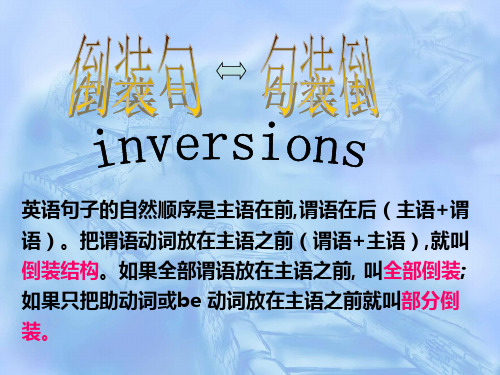
4. "Not only + 分句,but also + 分句"句型 中的前一分句要部分倒装。
但not only...but also...连接主语时,不倒装。 如: Not only the mother but also the children are sick.
如: ___ himself wrong, but his friends were wrong.
返回
英语
考点突破 有关动词的基本知识(本考点为动词的基本知识, 虽不会直接出题,但也要了解,对掌握和理解其他 考点有帮助。) 1.动词的基本形式 (1)动词原形 原形是动词最基本的形式,没有作任何变化,如like, come, watch, play, run, wash等。
返回
英语
(2)第三人称单数形式 在一般现在时态中,当句子的主语是第三人称单数时, 句中的谓语动词要用第三人称单数形式。动词的第三人称 单数形式一般在动词原形后面加s或es构成。 不规则变化:①动词be在一般现在时态中有三种形式: am, is和are。②have的第三人称单数形式是has。
注意:在上述句子中,如果主语为人称代词,
则主、谓不需要倒装。 In he came and back he went again.
4."分词(代词) + be + 主语"结构。
Walking at the head of the line was our teacher. Such was the story he told me.
3.当表示地点的介词词组(如on the wall, under the tree, in front of the house, in the middle of the room等)在句首时。
初中英语倒装句语法最新
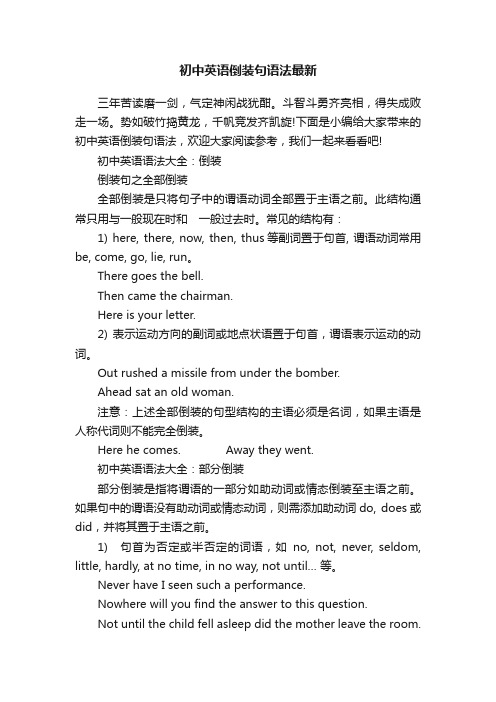
初中英语倒装句语法最新三年苦读磨一剑,气定神闲战犹酣。
斗智斗勇齐亮相,得失成败走一场。
势如破竹捣黄龙,千帆竞发齐凯旋!下面是小编给大家带来的初中英语倒装句语法,欢迎大家阅读参考,我们一起来看看吧!初中英语语法大全:倒装倒装句之全部倒装全部倒装是只将句子中的谓语动词全部置于主语之前。
此结构通常只用与一般现在时和一般过去时。
常见的结构有:1) here, there, now, then, thus等副词置于句首, 谓语动词常用be, come, go, lie, run。
There goes the bell.Then came the chairman.Here is your letter.2) 表示运动方向的副词或地点状语置于句首,谓语表示运动的动词。
Out rushed a missile from under the bomber.Ahead sat an old woman.注意:上述全部倒装的句型结构的主语必须是名词,如果主语是人称代词则不能完全倒装。
Here he comes. Away they went.初中英语语法大全:部分倒装部分倒装是指将谓语的一部分如助动词或情态倒装至主语之前。
如果句中的谓语没有助动词或情态动词,则需添加助动词do, does或did,并将其置于主语之前。
1) 句首为否定或半否定的词语,如no, not, never, seldom, little, hardly, at no time, in no way, not until… 等。
Never have I seen such a performance.Nowhere will you find the answer to this question.Not until the child fell asleep did the mother leave the room.当Not until引出主从复合句,主句倒装,从句不倒装。
- 1、下载文档前请自行甄别文档内容的完整性,平台不提供额外的编辑、内容补充、找答案等附加服务。
- 2、"仅部分预览"的文档,不可在线预览部分如存在完整性等问题,可反馈申请退款(可完整预览的文档不适用该条件!)。
- 3、如文档侵犯您的权益,请联系客服反馈,我们会尽快为您处理(人工客服工作时间:9:00-18:30)。
如果主语是人称代词,主语和谓语语序不变,不用倒装。
如:Here you are. There she comes.
There stood a dog before him. There exist different opinions on this question.
例题:
________ a beautiful palace ________ the foot of
the hill.
A. There stand; at
2)表语为形容词
Present at the meeting were Mr White and many other guests.
3)表语为过去分词 Seated on the ground are a group of young people.
4)表语为进行时态中的现在分词
Lying on the floor was a boy. Standing beside the desk was a teacher.
注意:在上述句子中,如果主语为人称代词,
则主、谓不需要倒装。 In he came and back he went again.
4."分词(代词) + be + 主语"结构。
Walking at the head of the line was our teacher. Such was the story he told me.
(2). 表示方向的副词out, in, up, down等 置于句首,要用全部倒装。如果主语是人称代 词,就不用倒装。如:
In came Mr. White. Up went the arrow into the air. Away went the boy.
题:There ________. And here ________. A. goes the phone; she comes B. is the phone going; is she C. does the phone go; does she come D. the phone goes; come she
题:________, a man of achievements, deep thoughts,
but with simple habits.
A. Einstein was such B. Such was Einstein
C. Einstein was so D. So was Einstein
I love English.
完全倒装 (full inversion) 谓语+主语
Here came the headmaster.
部分倒装 (partial inversion)
助动词/情态动词+ 主语 + 动词
Nerve will I forgive you.
一、完全倒装
1. There be结构。另外,在此结构中可以用 来代替be动词的动词有:exist, seem, happen, appear, live, rise, stand等。
句式: “否定词/词组+助动词/情态动词/be动词+主语+ 其他”。
1) —Have you ever seen anything like that before? —No, _____ anything like that before. A. I never have seen B. never I have seen C. never have I seen D. I have seen 2) She is not fond of cooking, ____ I. A. so am B. nor am C. neither D. nor do
3.当表示地点的介词词组(如on the wall, under the tree, in front of the house, in the middle of the room等)在句首时。
句式:介词短语+vi+主语(必须是名词)
如:At the foot of the hill lies a beautiful lake. East of thபைடு நூலகம் lake lie two towns. Under the tree was lying a wounded soldier.
英语句子的自然顺序是主语在前,谓语在后(主语+谓 语)。把谓语动词放在主语之前(谓语+主语),就叫 倒装结构。如果全部谓语放在主语之前, 叫全部倒装; 如果只把助动词或be 动词放在主语之前就叫部分倒 装。
基本语序(natural order):
主语+谓语+宾语(subject + predicate+ object)
________ are the days when teachers were looked
down upon.
A. Gone B. Go
C. To go D. Going
5,某些表语位于句首,保持句子平衡,以强 调表语. 句式:表语+系动词+主语(必须是 名词)
1)表语为介词短语
Among the goods are Christmas trees, flowers, candles and toys.
二、部分倒装
部分倒装是把be动词、情态动词、助动 词放到主语之前。如果句子中没有这些词, 要在主语之前加助动词do / does / did等, 而把原来的谓语动词变成原形放在主语之后。
1. 句首状语为否定词或半否定词的句子。
这类词或短语主要有never, neither, nor, little, seldom(很少,不常), rarely(很少,罕有), hardly, scarcely(几乎不,简直没有), no sooner(立即), by no means(决不) ,not only, in no way(决 不), at no time, few, not, no not until等,
B. There stands; under
C. Stands there; under D. There stands; at
2 ,(1).在以here、there、now、then等 副词开头的句子里。
句式:副词+vi+名词主语
“Here, There, Now, Then + come (或be,go,lie,run) + 主语" 结构。
